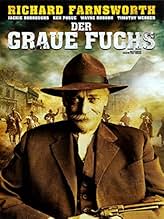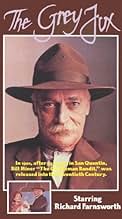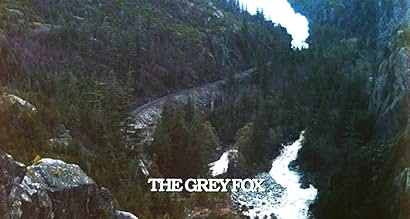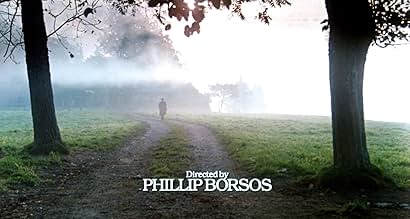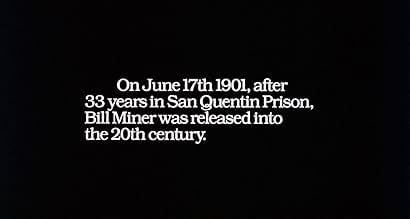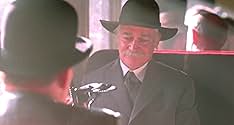NOTE IMDb
7,3/10
2,7 k
MA NOTE
Ajouter une intrigue dans votre langueWhen an aging, but gentlemanly stagecoach robber is released from prison, he decides to go to Canada to become a train robber.When an aging, but gentlemanly stagecoach robber is released from prison, he decides to go to Canada to become a train robber.When an aging, but gentlemanly stagecoach robber is released from prison, he decides to go to Canada to become a train robber.
- Réalisation
- Scénario
- Casting principal
- Récompenses
- 12 victoires et 9 nominations au total
Don MacKay
- Al Sims
- (as Don Mackay)
Jim McLarty
- Accomplice
- (as James McLarty)
Garry Chalk
- Oregon Train Crew - Mail Clerk
- (as Gary Chalk)
Avis à la une
I first heard of The Grey Fox a number of years ago, when I decided to look into some of the films made by Francis Ford Coppola's American Zoetrope film studio - it put out a number of real gems, like The Escape Artist, Kagemusha and Koyaanisqatsi, as well as a bunch that missed the mark a tad, but for some reason I never got round to watching this one till now.
It's the (relatively) true story of the aged stagecoach robber Bill Miner who, released back into a changing world after decades inside in 1901, takes up trainrobbing and finds himself up in Canada, with a new name and a new romance.
This, of course, isn't anything all that new, really just a lesser attempt on the same ideas of Butch Cassady and the Sundance Kid and other films with a sprinkling of Unforgiven thrown in. One of its main weaknesses is that it tells too much and doesn't show enough - we don't get to see hardly any of Miner's life, and there are no real action scenes to speak of. On the other hand, there is a great deal of beautiful photography, a heavenly soundtrack of Irish music by The Chieftains, and Richard Farnsworth gently twinkling in the lead role.
It's a small film, that doesn't really add up to all that much in the end, but it's a nice journey all the same, and the (fictionalized?) ending made me smile.
It's the (relatively) true story of the aged stagecoach robber Bill Miner who, released back into a changing world after decades inside in 1901, takes up trainrobbing and finds himself up in Canada, with a new name and a new romance.
This, of course, isn't anything all that new, really just a lesser attempt on the same ideas of Butch Cassady and the Sundance Kid and other films with a sprinkling of Unforgiven thrown in. One of its main weaknesses is that it tells too much and doesn't show enough - we don't get to see hardly any of Miner's life, and there are no real action scenes to speak of. On the other hand, there is a great deal of beautiful photography, a heavenly soundtrack of Irish music by The Chieftains, and Richard Farnsworth gently twinkling in the lead role.
It's a small film, that doesn't really add up to all that much in the end, but it's a nice journey all the same, and the (fictionalized?) ending made me smile.
This is the only movie I have ever purchased. There are so many awesome things about this movie. The plot is unusual. The characters are originals. The music by the Chieftains is rich and adds so much to the movie itself. The photography of the Canadian countryside is outstanding. Be sure to notice the little boy who wants an orange. You will see him again. I love the Canadian small town settings. Best of all is just watching Richard Farnsworth. His character is so appealing. Mr Farnsworth is so natural that he doesn't appear to be acting at all. I just love this movie. It is my all time favorite. The combination of the unusual characters, the time and place, the appealing Mr. Farnsworth, along with music by the Chieftains creates a very special movie.
10eltroll
This really is a masterpiece of film - and, unfortunately, largely unknown to the greater film-watching public in the United States. It is beautiful to watch, to listen to (with its soundtrack including both original work by award-winning composer Michael Conway Baker, of Canada, and the Chieftains), and to examine as a chronicle of the period that concluded the Wild West's grasp on the 19th Century and its reach for the 20th.
Bill Miner, the "Gentleman Bandit," was a historical figure whose long prison term for stagecoach robbery left him entirely unprepared (vocationally) for his release back into society - a society that was now devoid of stagecoaches, and beginning to discover the wonders of motorcars and moving pictures.
The 29-year-old director, Phillip Borsos (1953-1995), made this film tribute to the last outlaw of the Wild West and to the region that he lived in. While others might have gone heavy-handed and clichéd in such a production, Borsos' eye and ear both figure significantly in the film's direction, and its numerous examples of originality:
I have hummed the music from its tuneful soundtrack since the first time I saw it in its initial U.S. theatrical release, and have wanted to visit Kamloops, BC, ever since. If you can stand movies without gratuitous pyrotechnics or violence, don't let another day go by without checking out this film classic.
Bill Miner, the "Gentleman Bandit," was a historical figure whose long prison term for stagecoach robbery left him entirely unprepared (vocationally) for his release back into society - a society that was now devoid of stagecoaches, and beginning to discover the wonders of motorcars and moving pictures.
The 29-year-old director, Phillip Borsos (1953-1995), made this film tribute to the last outlaw of the Wild West and to the region that he lived in. While others might have gone heavy-handed and clichéd in such a production, Borsos' eye and ear both figure significantly in the film's direction, and its numerous examples of originality:
- a senior citizen star (the late Richard Farnsworth - whose Hollywood career had started as a stuntman, in Westerns - playing Bill Miner as a thoughtful and kind gentleman) who even gets to look hunky;
- a respectful treatment of an early 20th Century feminist (played by Jackie Burroughs);
- cinematography that highlights the beauty of the Pacific Northwest, rather than some anonymous California desert;
- a soundtrack that ISN'T Coplandesque (or Morriconesque);
- a 'cowboy picture' where the hero gets the girl, but doesn't get vulgar or trite or even testosterone-driven; AND
- an accurate look at the turn-of-the-century a hundred years ago in a landscape that hasn't entirely disappeared. Yet.
I have hummed the music from its tuneful soundtrack since the first time I saw it in its initial U.S. theatrical release, and have wanted to visit Kamloops, BC, ever since. If you can stand movies without gratuitous pyrotechnics or violence, don't let another day go by without checking out this film classic.
I think this is one of the most flawless and beautiful movies of all time. The acting and casting is impeccable. What I particularly love is the script; so few words but when something is spoken each line has such weight and impact. And the music is amazing. What a brilliant idea, a western with Celtic (the Chieftains) music. The spirit and emotion of the music enhances every scene and is so fresh and unexpected and ultimately, right. And it's such a wonderful love story. Normally I wouldn't care about a romance between two older characters, but I root for these two characters in each and every scene. Richard Farnsworth was nominated for Best Actor and it is a shame he didn't win. Please, watch it if you haven't.
A very different kind of Western, "The Grey Fox" is set mostly in Canada, moves at an unhurried pace, and stars a senior citizen. Richard Farnsworth didn't make the jump from stunt man to actor until he was well past leading man age, but he was wonderful in films like "The Natural", "Misery", and "The Straight Story". This, however, has to be his best performance. He exudes subtle grace as gentleman train robber Bill Miner, who gets out of prison and is forced to adapt to a world that has passed him by. There's also a very sweet romance between Miner and a feminist photographer. My favorite part of the film is a montage of their courtship set to Miner singing "Betsy From Pike". I also loved the Irish music by the Chieftains, which seemed to fit perfectly with the lovely Canadian scenery. It will be too slow for most audiences, but if you love small independent films that don't pander to teenage moviegoers, this gem will be right up your alley.
Le saviez-vous
- AnecdotesThe film has been designated and preserved as a "masterwork" by the Audio-Visual Preservation Trust of Canada.
- GaffesAfter Bill reunites with his Sister they walk together toward the house to meet her husband and pass a 3 point spring tooth harrow. The three point system wasn't invented until the late 1920s.
- Bandes originalesSea Image
Arranged by Paddy Moloney
Meilleurs choix
Connectez-vous pour évaluer et suivre la liste de favoris afin de recevoir des recommandations personnalisées
- How long is The Grey Fox?Alimenté par Alexa
Détails
Box-office
- Budget
- 4 500 000 $CA (estimé)
- Montant brut aux États-Unis et au Canada
- 5 516 140 $US
- Montant brut mondial
- 5 516 140 $US
- Durée1 heure 32 minutes
- Couleur
- Mixage
- Rapport de forme
- 1.85 : 1
Contribuer à cette page
Suggérer une modification ou ajouter du contenu manquant

Lacune principale
By what name was The Grey Fox (1982) officially released in India in English?
Répondre

